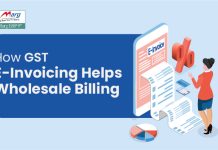- Challenges Related to E-invoicing System
- Complications while Integrating ERP Systems
- Cancellation and Amendment Policies of E-Invoicing
- Non–Bifurcation of B2B and B2C Invoices
- System Security Issue of E-Invoicing
- Complications in Reconciliation of E-invoice data
- Distinct Workflow to Process Documents Other Than B2B and Export Invoices
- The Bottom Line On E-Invoicing System
As we all know that the system of E-invoicing has already been implemented in India on 1st October 2020, and with the evolution of this system, everyone is facing some challenges. Therefore, keeping this in mind we’ve tried to list all the possible challenges you might come across due to the New Invoicing Feature.
Table of Contents
ToggleChallenges Related to E-invoicing System
- Complications while Integrating ERP Systems.
- Cancellation and Amendment Policies of e-invoicing
- Ineligibility of e-invoicing of B2C transactions.
- Non–Bifurcation of B2B and B2C invoices.
- System Security Issue
- Complications in Reconciliation of E-invoice data
- Distinct workflow to process documents other than B2B and Export invoices.
Complications while Integrating ERP Systems
It has been observed that E-invoicing is almost possible when customers are using ERP’s, ASP’s or GSP’s because ERP’s are customizable, and hence the invoice format can be changed according to the recently launched scheme by the government. Moreover, companies that are using homegrown ERPs’ are facing API integration challenges.
Hence, it is suggested that e- Invoicing should work similarly in all systems.
Cancellation and Amendment Policies of E-Invoicing
- The e-invoicing system doesn’t allow you to make partial cancellations of invoices and hence you can only cancel the integrated e-invoice.
- Also, it is noted that you can only cancel the e-invoice within 24 hours on the IRP.
- You can only edit or amend the e-invoice (Including the invoice number) after a brief explanation of the reason for edit and need to make proper clarifications for audit-related requirements.
So it has been observed that the process of cancellation and amendment needs lots of effort and time to complete all the formalities, although customers have only 24 hours (as per the terms & Conditions of e-invoicing) to complete the process.
Non–Bifurcation of B2B and B2C Invoices
As we already know that e-invoicing is applicable only on B2B or export invoices. Therefore, in case if you want to generate E-way for your B2B invoices then firstly you need to filter those transactions from the bucket of invoices and it will take a considerable amount of time and effort.
Hence it is suggested that the portal should display the bifurcated data of B2C and B2B transactions so that it will take the least time to complete the process
System Security Issue of E-Invoicing
As we know e-invoicing is a one step ahead taken by the Indian government to maintain stability in taxation systems of India and although the government has provided some relaxation in the provision of e-invoicing for October 2020, while in the context of the same it has been noted that there are some system stability issues/errors such as invalid GSTIN, HSN/SAC code on IRP.
Hence it is suggested that the government must resolve these issues for the proper functioning of the e-invoice system.
Complications in Reconciliation of E-invoice Data
It has been observed that in some of the cases you need to update GSTR-1 after uploading the invoices on IRP and afterward both the levels of data (GSTR-1 and e-invoice) will remain save on GST server, Thus both should be reconciled automatically (When needed) although it has been noted that the taxpayer need help of some tool or utility to reconcile the same.
Therefore, it is suggested that it should be reconciled automatically by the GST server.
Distinct Workflow to Process Documents Other Than B2B and Export Invoices
As we know the provision of e- invoice applies only on B2B or export invoices, and it includes different workflow to process the other transactions like, bills of supply, job work and other similar transactions. Thus it will take lot of time and effort to complete it.
Hence it suggested that new and similar workflow to B2B will also form for the other transactions as well.
The Bottom Line On E-Invoicing System
Well after studying all the point we’ve come across to the conclusion that E-invoicing is newly launched system after all the conferences, discussions and feedbacks by the government under GST so it is under development period and all the challenges will be unfolded only when the taxpayer start using it on the real-time basis. Although by choosing Marg e-invoicing software your efforts will get automatically reduced. As we have designed this e-invoicing software keeping the taxpayer’s pain areas in mind.






